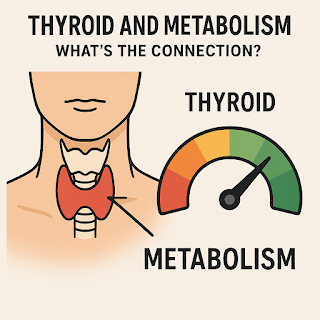THYROID
The thyroid is a small, butterfly-shaped gland located at the front of your neck, just below your Adam’s apple. Despite its small size, it plays a major role in regulating your body’s metabolism.
🧠 How It Works
The thyroid works in coordination with the pituitary gland in your brain, which releases TSH (Thyroid Stimulating Hormone). TSH tells the thyroid when to produce more hormones. It's like a thermostat that helps maintain balance.
🔬 What Does the Thyroid Do?
The thyroid produces and releases hormones—primarily:
-
T3 (triiodothyronine)
-
T4 (thyroxine)
These hormones affect nearly every organ in your body and help regulate:
-
✅ Metabolism (how your body uses energy)
-
❤️ Heart rate
-
🌡️ Body temperature
-
🧠 Brain development (especially important in infants/children)
-
🩸 Cholesterol levels
-
💤 Sleep and energy levels
-
🍽️ Appetite and weight regulation
-
🦴 Bone health
🧘 Lifestyle Tips for a Healthy Thyroid
🧠 1. Manage Stress
-
Chronic stress raises cortisol, which disrupts thyroid hormone conversion.
-
Try yoga, deep breathing, meditation, or pranayama.
-
Even 15–20 minutes daily can help.
💤 2. Prioritize Sleep
-
Aim for 7–9 hours of quality sleep.
-
Poor sleep affects thyroid hormone levels and weight regulation.
🏃 3. Exercise Regularly
-
Moderate exercise (like walking, swimming, or yoga) helps balance hormones and metabolism.
-
Avoid intense overtraining, especially with hyperthyroidism, as it can worsen fatigue or heart issues.
☀️ 4. Get Enough Vitamin D
-
Low Vitamin D is common in thyroid disorders.
-
Spend 10–20 mins in sunlight daily or take supplements if needed.
🍽️ 5. Avoid Skipping Meals
-
Irregular meals can worsen fatigue and weight issues in thyroid disorders.
-
Eat small, balanced meals at regular times.


Comments
Post a Comment